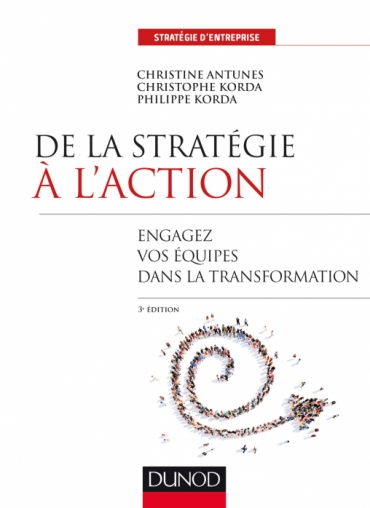The first edition of this book was entitled « But what are they all waiting for to deploy my strategy? »
Dealing with collective change, it sets out a method for supporting change management projects focused on human development.
Summary of the book “From Strategy to Action”:
The book is structured in three main parts:
- The energy of commitment
- The energy of movement
- The energy of management
Underlying commitment are the concepts of conflicts of interest, collective and individual values, and the empathy that managers must develop with their staff. This section concludes with a look at managing emotions.
In the second part, dedicated to the energy of movement, the approach and notions of heroes are developed, as well as new behavioural models in the organisation, in particular to lead progressive changes in corporate culture.
Training is approached as a complementary lever for change: we speak exclusively of training associated with the development of new anchors and habits and not as theoretical contributions with heavy and unexploited content. The levers sought through training are training and group dynamics.
In the third part – management energy – the focus is more on management’s ability to initiate, guide, accelerate and encourage movement within the company. A focus on the place of the middle manager is relayed and shows his or her sometimes “in-between-the-scenes” position, which requires duties as well as rights.
This is followed by a discussion of the value of objectives, which focus on progress rather than goals.
The authors “from strategy to action”:
This book was co-written by Christine Autunes, Christophe KORDA and Philippe KORDA
Quotations and extracts from “de la stratégie à l’action”:
“The illiterates of the twenty-first century will not be those who cannot read and write, but those who are incapable of learning, unlearning and relearning” – Alvin TOFFLER
“How can a manager claim to be unaware of the objectives when these are posted in the corridor he walks down at least ten times a day? (…) For your staff to understand that they are being asked to take action, you need to tailor your message to their level, present them with concrete examples of the actions to be taken and set out the follow-up procedures
“When there are more than three stated priorities, it generally means that there are none in reality”
“If you compare the different entities of a company, don’t compare them on the basis of their performance in absolute terms! The only thing that counts is progress
Focus on a chapter of the book “From Strategy to Action
We’d like to focus on the last paragraph, entitled “Make execution your trademark”, illustrated by a quote from Racine: “We need actions, not words”.
The authors set out 5 precepts:
- Choose managers on the basis of their ability to act
- Make inaction impossible
- Embody execution
- Adapt a flawless personal organisation
- And breathe optimism.
Beyond the distinction between IQ and EQ (Intelligence and Emotional Quotient), the authors develop the concept of “DFC”, or “Determination to get things done” as a form of intelligence.
Determination is seen as a source of energy for employees. Determination is an energy that drives movement and the desire to do things, and pushes back the barriers of scepticism through action.
In support of this, reference is made to a study which shows that a person displaying negative behaviour (refusal to make an effort, incessant criticism, aggressiveness) could affect a team’s performance by 30 to 40%.
A quotation from Gandhi is then offered to support these remarks: “You must be the change you expect to see in the world”
With reference to the organisation, a reference to David Allen and the GTD method (getting things done) carries the message on prioritising actions in a change management project.
Finally, a focus on optimism, as demonstrated by Martin P. Seligman in his research, is advocated as a source of success. While discouragement can spread very quickly, optimism can also be acquired and developed. The emphasis here is on self-assurance, confidence and enthusiasm as contagious emotional states.
If you want to test your ability to support change, use the ASSESS MANAGER test.
This is one of the managerial skills assessed in the test’s skills framework.

To go further with Assess Manager



